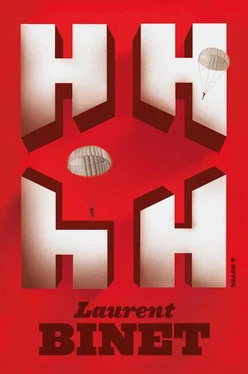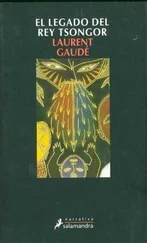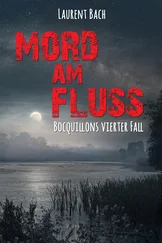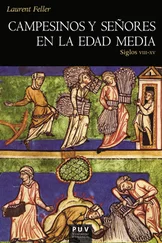Where is that bloody fireman’s testimony?
Today is May 27, 2008. When the firemen arrive, about 8:00 a.m., they see the SS everywhere and a corpse on the pavement. No one has thought to move Opalka’s body. The firemen listen as they are told what they have to do. It was Pannwitz’s brilliant idea: to smoke them out, and—if that doesn’t work—to drown them. None of the firemen want this job. Among their ranks, one hisses: “If you want that done, don’t look at us.” The head fireman chokes with anger: “Who said that?” But who would have become a fireman to end up lumbered with such a job? So a volunteer is chosen to smash off the iron bars that protect the vent. They fall after a few blows and Frank applauds. And thus a new battle begins around this horizontal orifice, barely three feet long and ten inches high; this black hole that, for the Germans, seems to open onto the unknown and the prospect of death; this shaft of light for the men in the crypt, which also signifies death. This small opening is now the one square on the chessboard coveted by all the pieces remaining in the game. Occupy this square, and you have a crucial positional advantage in an endgame where white—because, in this particular game, it’s black who moved first and who holds the initiative—will stage a heroic, against-all-odds defense.
May 28, 2008. The firemen manage to slide their firehose through the vent. The hose is connected to a fire hydrant, and the pumps are activated. Water pours through the opening.
May 29, 2008. The water begins to rise. Gabčík, Valčík, and their two comrades have wet feet. As soon as a shadow approaches the vent, they shoot. But the water keeps rising.
May 30, 2008. The water is rising, but very slowly. Frank is getting impatient. The Germans toss tear-gas grenades into the crypt to smoke out its occupants, but it doesn’t work, because the grenades fall in the water. Why didn’t they try this before? It’s a mystery. I don’t think you should rule out the possibility that they are acting, as is often the case, in a rushed and disorderly way. Pannwitz seems to me the kind of man who thinks things through carefully, but I suppose he may not be in charge of all the military operations. And perhaps he, too, gives in to panic? Gabčík and his friends have wet feet, but at this rate they will die of old age before they’re drowned.
June 1, 2008. Frank is extremely nervous. The more time passes, the more he fears that the parachutists will find a way of escaping. The water could even help them if they manage to find a leak, because, obviously, the crypt is not exactly watertight. Inside, they’re getting organized. One is in charge of gathering up the grenades and throwing them back outside. Another keeps digging unrelentingly in the tunnel. A third uses a ladder to push the firehose away from the vent. And the other one lets off bursts of gunfire whenever someone approaches. On the other side of the stone wall, soldiers and firemen, bent double, have to keep putting the firehose back in place while avoiding the spray of bullets.
June 2, 2008. The Germans bring a gigantic searchlight to dazzle the men in the crypt, so they can’t aim properly. But before they’ve even had time to switch it on, a burst of gunfire, like an ironic punctuation mark, puts it out of service.
June 3, 2008. The Germans keep sliding the hose into the crypt, to drown them or smoke them out, but each time the parachutists use the ladder like a telescopic arm to push it back. I don’t understand why the Germans couldn’t put the firehose through the trapdoor in the nave, which is still—as far as I’m aware—wide open. Perhaps the hose is too short, or they can’t get into the nave with the kind of equipment required? Or perhaps it’s an unlikely providence that is depriving them of all tactical lucidity?
June 4, 2008. The water is up to their knees. Outside, Čurda and Ata Moravec are brought to the vent. Ata refuses to speak, but Čurda shouts through the opening: “Give yourselves up, lads! They’ve treated me well. You’ll be prisoners of war—it’ll be all right.” Gabčík and Valčík recognize his voice; now they know who betrayed them. They reply in the usual way: with a burst of gunfire. Ata stands with his head lowered. His face is swollen and he has the absent look of a young man with one foot in the land of the dead.
June 5, 2008. After about ten feet, the earth in the tunnel becomes hard. Do the parachutists stop digging so they can concentrate on shooting? I can’t believe that. They go at it even harder. They’ll dig with their fingernails if they have to.
June 9, 2008. Frank can bear it no longer. Pannwitz tries to think. There must be some other way in. They used to put dead monks in the crypt. How did they get the bodies down there? Inside the church, his men continue their search. They clear away the rubble. They pull up the carpets. They demolish the altar. They tap on the stone walls. They search high and low.
June 10, 2008. And they find something else. Beneath the altar, there’s a heavy slab that sounds hollow when you tap it. Pannwitz sends for the firemen and orders them to break the slab. A sectional drawing at this moment would show the firemen hammering away with a pickax at ground level while the parachutists do the same underground. The picture would be captioned: “Race against death—and against all odds.”
June 13, 2008. Twenty minutes have passed and the firemen have worn themselves out on the stone slab, to no effect. In bad German, they stammer to the watching soldiers that it’s impossible to break this stone with the tools at hand. The weary SS guards dismiss them and bring in some dynamite. The explosives experts fuss around the slab for a while, and when everything’s ready they evacuate the church. Outside, everyone is told to move back. Below, the parachutists have surely stopped digging. The sudden silence must have alerted them, coming after such a racket. Something is about to happen—they can’t help but be aware of it. The explosion confirms it. A cloud of dust falls over them.
June 16, 2008. Pannwitz orders the rubble cleared away. The slab has been smashed in two. A Gestapo agent puts his head through the gaping hole. Straightaway, bullets whistle around his face. Pannwitz gives a satisfied smile. They’ve found the way in. They send two stormtroopers down, but it’s the same old problem: a cramped wooden staircase allows only one man at a time to pass. The first unlucky SS guards are shot down like skittles. But from now on, the parachutists have to watch over three different openings. Taking advantage of this distraction, one of the firemen grabs the ladder as it’s being used to push the firehose away from the vent for the umpteenth time, and manages to hoist it up to the street outside. Frank applauds. The fireman will be rewarded for his zeal (but punished after the liberation).
June 17, 2008. The situation is getting more and more difficult. The defenders have been deprived of their makeshift telescopic arm, and now their bunker is shipping water everywhere—both figuratively and literally. As soon as the SS have two entry points, added to the danger posed by the vent, the parachutists realize it’s all over. They’re screwed and they know it. They stop digging, if they haven’t already, and concentrate entirely on shooting their enemies. Pannwitz orders a new attack through the main entrance while grenades are thrown into the crypt and another man tries to get down through the trapdoor. Inside the crypt, the Stens spray bullets at the assailants. It’s total chaos. It’s the Alamo. And it goes on and on, and it doesn’t end, it comes from all sides, through the trapdoor, down the stairs, through the vent; and while the grenades fall in the water and don’t explode, the four men empty their guns at everything that moves.
Читать дальше












